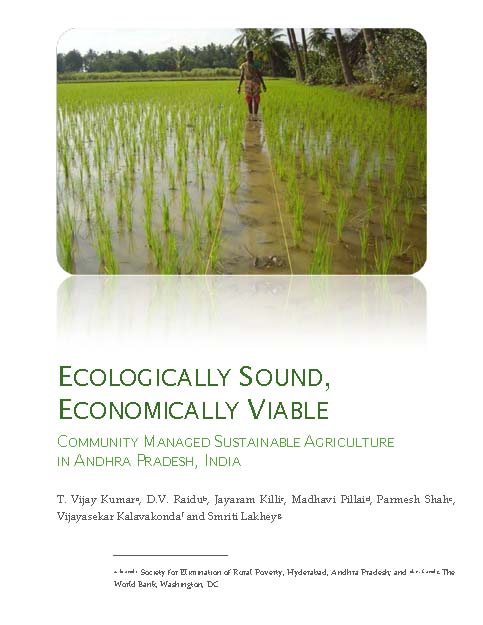/topics/irrigation
Irrigation
Accelerated programmes - What can the water sector learn from the power sector? – An article in EPW by Tushaar Shah
Posted on 16 Jun, 2011 09:11 PMThe Government of India’s 15-year old AIBP has come under much-deserved criticism for all-round non-performance. It was introduced to support states in "last mile" public irrigation projects, that is, projects which are nearly completed but whose full benefits can start flowing only after small, incremental investments are made. Yet, the AIBP has been used mostly for funding new projects.
The economic impact of forest hydrological services on local communities - A case study from the western ghats of India by South Asian Network for Development and Environmental Economics (SANDEE)
Posted on 16 Jun, 2011 03:38 PMThe paper informs that the conventional wisdom that ‘more forest is always better’ has dominated policy making in the management of forested watersheds. In the context of the supposed hydrological regulation service provided by forest ecosystems, however, hydrologists have debated this assumption for more than two decades.
Productivity enhancement through up-scaling SRI experiences in Chattisgarh - Brief report of a one-day workshop organised by PRADAN on May 26, 2011
Posted on 14 Jun, 2011 06:11 PMIn May 2008, PRADAN initiated the SRI method of paddy cultivation in selected areas of Chhattisgarh through its partner organisations with financial support from Sir Dorabji Tata Trust (SDTT). It supported 11 NGOs who together could reach 4600 framers in 9 districts of Chhattisgarh in last Kharif.
Report of the workshop on High resolution cartosat satellite data
Posted on 04 Jun, 2011 01:01 PMIntroduction
Irrigation development is essential to ensure water and food security on a sustainable basis. Large scale development of irrigation infrastructure is the key to achieve these objectives. Accelerated Irrigation Benefit Program (AIBP) was launched by Government of India during 1996-97 to provide financial assistance to State Governments with the aim of speeding up the implementation of on-going irrigation / multi-purpose water resources projects. Monitoring of the projects covered under the AIBP is periodically done by the Central Water Commission / Ministry of Water Resources with the help of its regional offices situated all over the country. In the absence of real time maps during construction, the conventional monitoring is done through discussions with field authorities and random field checks. The monitoring reports with non-spatial information generally lack in the synoptic view of the critical gaps and the quantitative progress achieved in irrigation potential creation.
The availability of data from Cartosat - 1 and Cartosat - 2 high resolution satellites has enhanced the scope of infrastructure mapping and monitoring. This data has immense potential for assessment of progress of Irrigation works and closer visualization of spatial irrigation network.
The consultative committee of the Ministry of Water Resources discusses the role and functions of Central Water Commission - PIB Release
Posted on 30 May, 2011 03:25 PMThe Consultative Committee of the Ministry of Water Resources met recently under the Chairmanship of Shri Salman Khurshid, Minister of Water Resources. Minister of State for Water Resources, Shri Vincent H. Pala was also present along with the secretary and other senior officers of the Ministry.
Sustainable Sugarcane Initiative (SSI) produces more sugarcane with less water and chemical inputs - Videos by AgSRI
Posted on 17 May, 2011 04:38 PM
Groundwater management in Andhra Pradesh - Time to address real issues – A report by Institute for Resource Analysis and Policy
Posted on 17 May, 2011 02:16 PMWith 49 per cent of the total irrigation from groundwater, the state of Andhra Pradesh accounts for 5.3 per cent of the net groundwater irrigated area in the country.
Ecologically sound, economically viable community managed sustainable agriculture in Andhra Pradesh – A report by Society for Elimination of Rural Poverty and World Bank
Posted on 15 May, 2011 09:56 PM This report by Society for Elimination of Rural Poverty and World Bank deals with Community Managed Sustainable Agriculture (CMSA) in Andhra Pradesh. The paper also analyses the initial results of economic and environmental impact of CMSA, distills the key lessons learned from the Andhra Pradesh experience, and draws possible implications for future.
This report by Society for Elimination of Rural Poverty and World Bank deals with Community Managed Sustainable Agriculture (CMSA) in Andhra Pradesh. The paper also analyses the initial results of economic and environmental impact of CMSA, distills the key lessons learned from the Andhra Pradesh experience, and draws possible implications for future.
To address the adverse impacts of green revolution, the alternative approach to manage agriculture i.e., CMSA is being tested and practiced in the State. The CMSA approach replaces the use of chemical pesticides with a combination of physical and biological measures—including eco-friendly bio-pesticides—and complements it by adopting biological and agronomic soil fertility improvement measures leading to reduced use of chemical fertilizers.
Hydrological and farming system impacts of agricultural water management interventions for sustainable groundwater use in North Gujarat - A paper by Institute for Resource Analysis and Policy
Posted on 15 May, 2011 08:56 PMThe report by Institute for Resource Analysis and Policy (IRAP) and Society for Integrated Land and Water Management (SOFILWM) presents the findings of a research study undertaken in north Gujarat region, an area which has been undergoing significant changes in its farming systems as a result of several developmental interventions.
The study looked at a project initiated by IWMI and managed by SOFILWM in which water-efficient irrigation devices, water-efficient crops and land management practices were introduced among farmers in an effort to help them cut down groundwater use in irrigated agriculture without adversely affecting the economic prospects of farming.
Pampered views and parrot talks – In the cause of well irrigation in India – A paper by Institute for Resource Analysis and Policy
Posted on 15 May, 2011 06:14 PMIt is widely held that surface irrigation is becoming increasingly irrelevant in India’s irrigation landscape in spite of increased investments, and therefore future investments in irrigation should be diverted for well irrigation.




